Bosch Dishwasher Problems: All The Fixes From A To Z
Imagine the convenience of having a dishwasher to handle all your menial housework. But what if it suddenly stops working?
You’ll find yourself scrubbing dishes by hand, struggling to remove grime and worrying about germs. No one wants that.
The most common bosch dishwasher problems include unexpected filling, dirty water, drainage issues, soap dispenser malfunction, water filling failure, poor drying, and no heating.
In this article, I’ll guide you through fixing all these annoying issues, so you’ll never have to deal with a broken dishwasher again.
Let’s get started, shall we?
Bosch Dishwasher Problems And Their Easy Fixes
Now let’s check out what causes the issues I’ve mentioned and their thorough step by step fixes.
1. Dishwasher Suddenly Fills For Seemingly No Reason
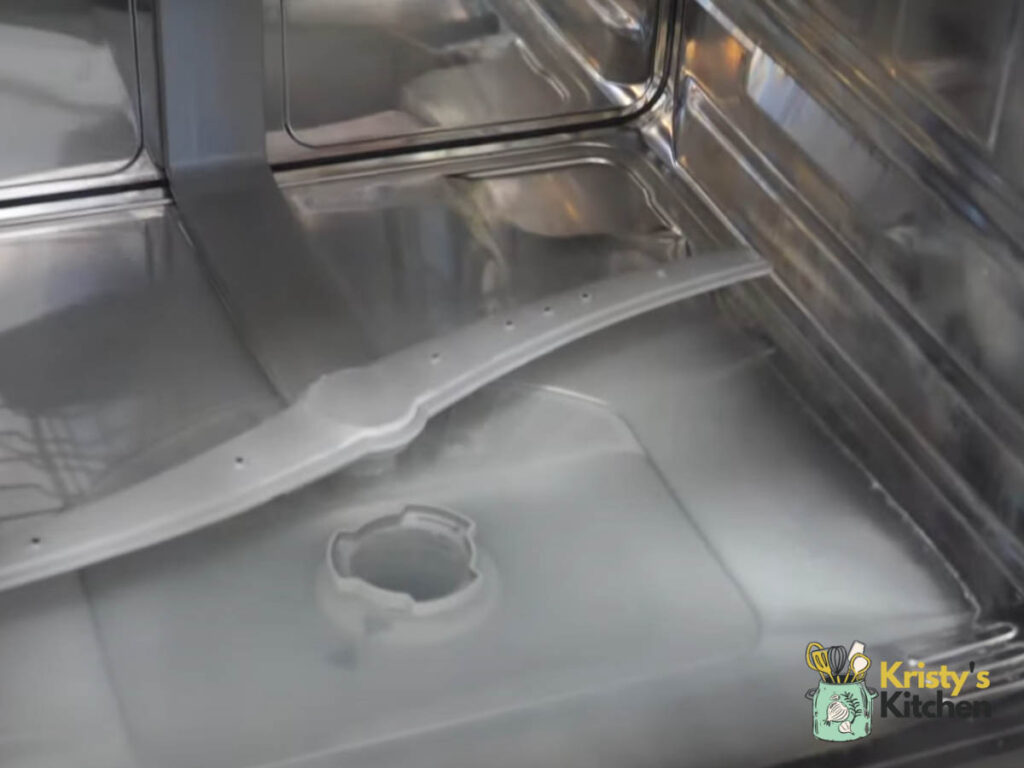
Has your Bosch dishwasher mysteriously started filling with water even when it’s not in use? Don’t worry, I’ve got you covered.
This unexpected filling can be quite puzzling, but it’s usually caused by a faulty water inlet valve.
This valve fails to close properly, allowing water to flow continuously into the dishwasher.
Step By Step Solution To Dishwasher Suddenly Filling
- First, for your safety, make sure to shut off the dishwasher’s power supply.
- Locate the water supply valve under your sink and turn it off to stop the water flow.
- Now, remove the kick plate at the bottom of your dishwasher to access the inlet valve.
- Grab a trusty multimeter and test the water inlet valve for continuity. If there’s no continuity, it means the valve is faulty and needs to be replaced.
- Disconnect the valve from the dishwasher’s water supply line and electrical connectors.
- Install a brand new water inlet valve, making sure all connections are secure.
- Turn on the water supply valve under your sink.
- Finally, restore power to your dishwasher and run a test cycle to see if the problem is resolved.
2. Unclean Water In Dishwasher
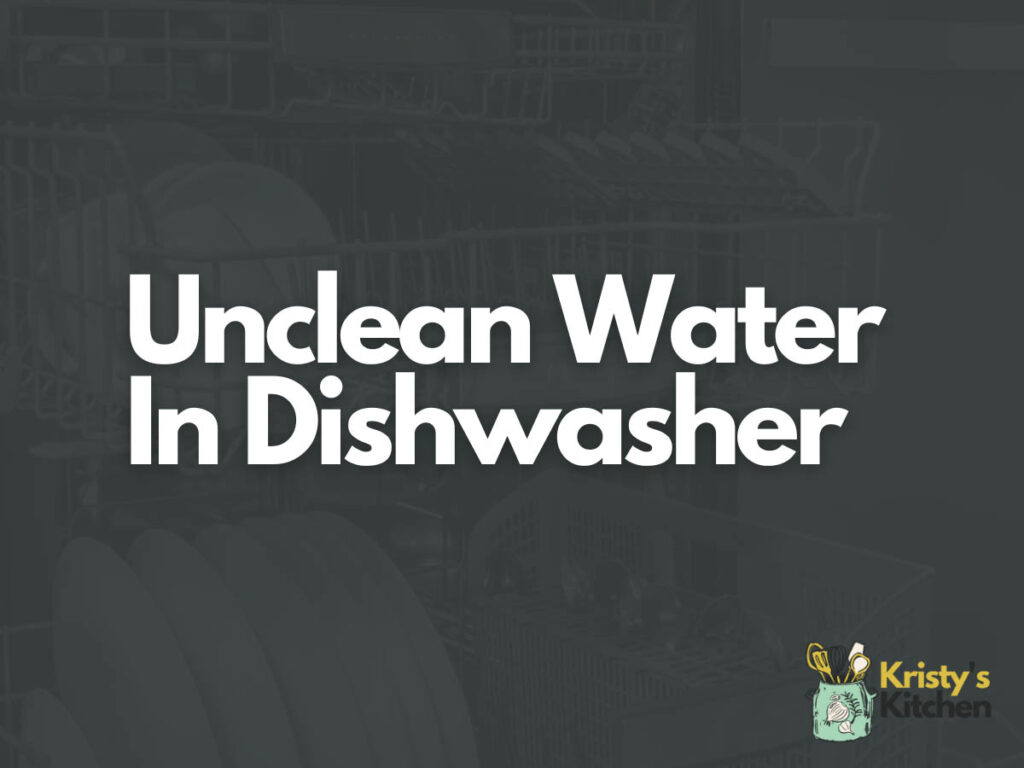
Is your Bosch dishwasher leaving your dishes covered in grime or deposits? That’s definitely not the sparkling clean you were hoping for.
The culprit here is most likely unclean water in your dishwasher. This can be caused by clogged filters, a faulty check valve, or issues with the pump.
Step By Step Solution To Unclean Water in Dishwasher
- Start by checking your dishwasher’s filter. Give it a thorough cleaning and remove any debris or food particles trapped inside.
- Take a look at the check valve, located at the bottom of the dishwasher tub near the drain. Make sure it moves freely and isn’t clogged with debris.
- If the check valve seems damaged or blocked, it’s time to replace it with a new one.
- Moving on to the pump, check for any blockages or foreign objects that might be obstructing the impeller. Clean the pump and remove any debris if necessary.
- Run a cleaning cycle with a dishwasher cleaner or vinegar to eliminate any buildup or deposits.
- When loading your dishwasher, ensure you arrange the dishes in a way that allows proper water circulation.
If the problem is still there at this point, you should reach out to Bosch customer service.
3. Dishwasher Drainage Problem
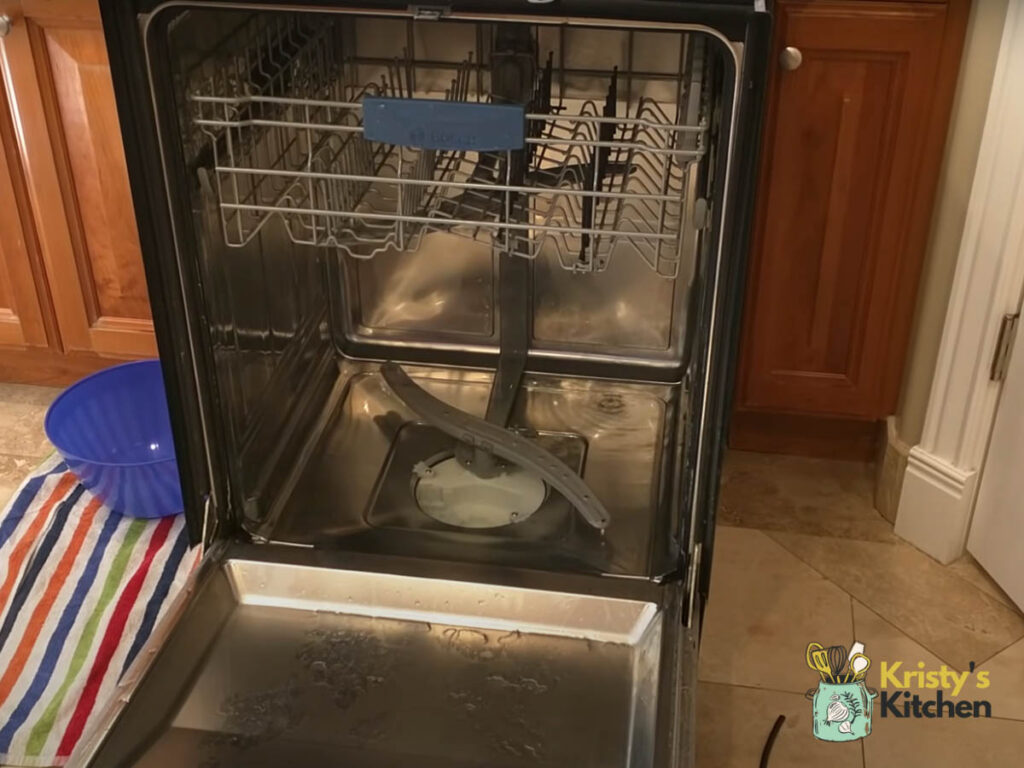
Is your Bosch dishwasher refusing to drain properly? It’s quite a common issue, but I’m here to help you tackle it.
Improper drainage can lead to a pool of water at the bottom of your dishwasher, and that’s not what you signed up for when you invested in this handy home appliance.
The problem may lie with a clogged drain hose, a malfunctioning drain pump, or a blockage in the drain system.
Step By Step Solution To Dishwasher Drainage Problem
- First things first, check the drain hose for any kinks, clogs, or obstructions. Straighten the hose if needed and remove any debris you find.
- Ensure that the drain hose is securely connected to the sink or garbage disposal unit without any air gaps or leaks.
- Take a peek at the drain pump for any blockages. Safely disconnect the dishwasher from the power supply and remove the pump cover. Clean the impeller and pump housing to remove any debris.
- Test the drain pump’s continuity using a trusty multimeter. If it’s found to be faulty, it’s time to replace the drain pump.
- Clean your dishwasher’s air gap by removing the cap and clearing any debris from there and connecting hoses.
- Run a drain cycle to check if the problem has been resolved.
If water still doesn’t drain properly, you should seek professional assistance to inspect the drain system for potential blockages.
4. Soap Dispenser Not Working
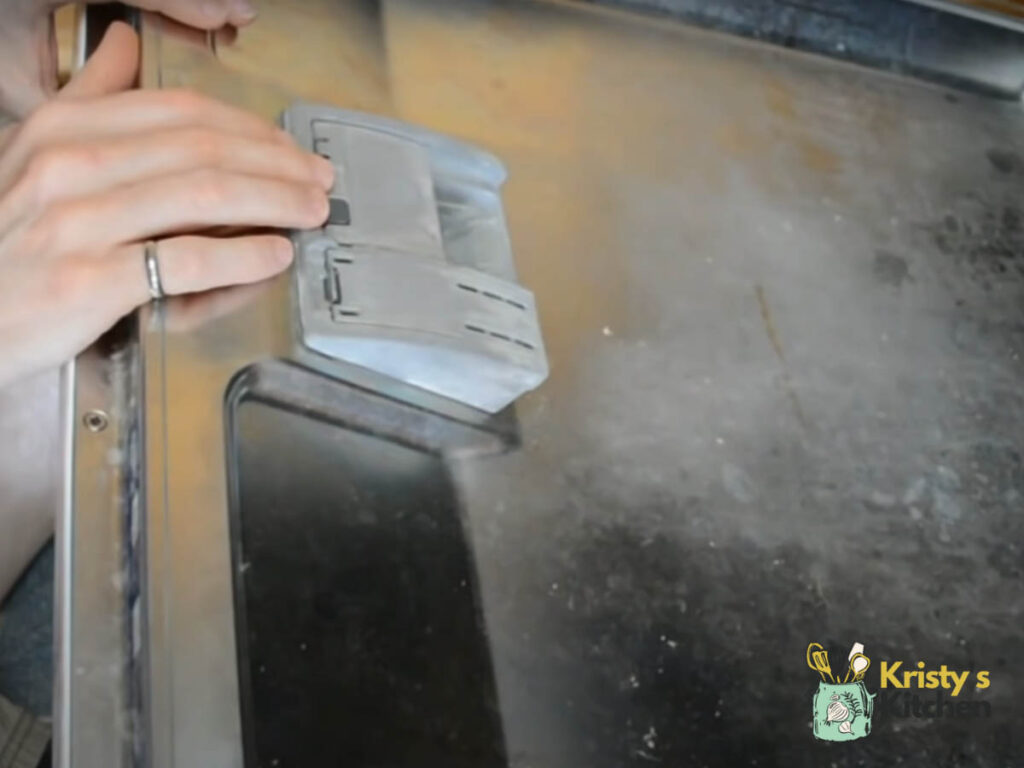
Is your Bosch dishwasher refusing to dispense detergent during the wash cycle? That’s definitely going to impact the cleanliness of your dishes.
The issue could be related to a malfunctioning dispenser door, a clogged dispenser compartment, or problems with the dispenser’s electrical components.
Step By Step Solution To Soap Dispenser Not Working
- Take a close look at the dispenser compartment to see if there are any clogs or debris obstructing the dispenser door. Clear away any residue or buildup you find.
- Check that the dishwasher’s spray arm isn’t hitting the dispenser door, preventing it from opening properly. Rearrange dishes if needed.
- Inspect the dispenser door mechanism for any damage or misalignment. If the door is broken or doesn’t open smoothly, it may need to be replaced.
- Carefully examine the wiring and connections to the dispenser’s electrical components. Ensure they are securely connected and free from damage.
- If you suspect an electrical issue, grab your multimeter and test the dispenser’s solenoid or other electrical components for continuity. Replace any faulty parts.
- Load your dishwasher correctly, ensuring there’s enough space between dishes for proper water circulation.
- Don’t forget to use the recommended type and amount of dishwasher detergent.
If the soap dispenser still refuses to cooperate, you probably can’t DIY the fix; you’ll need to reach a Bosch dishwasher service technician.
5. Dishwasher Doesn’t Fill With Water
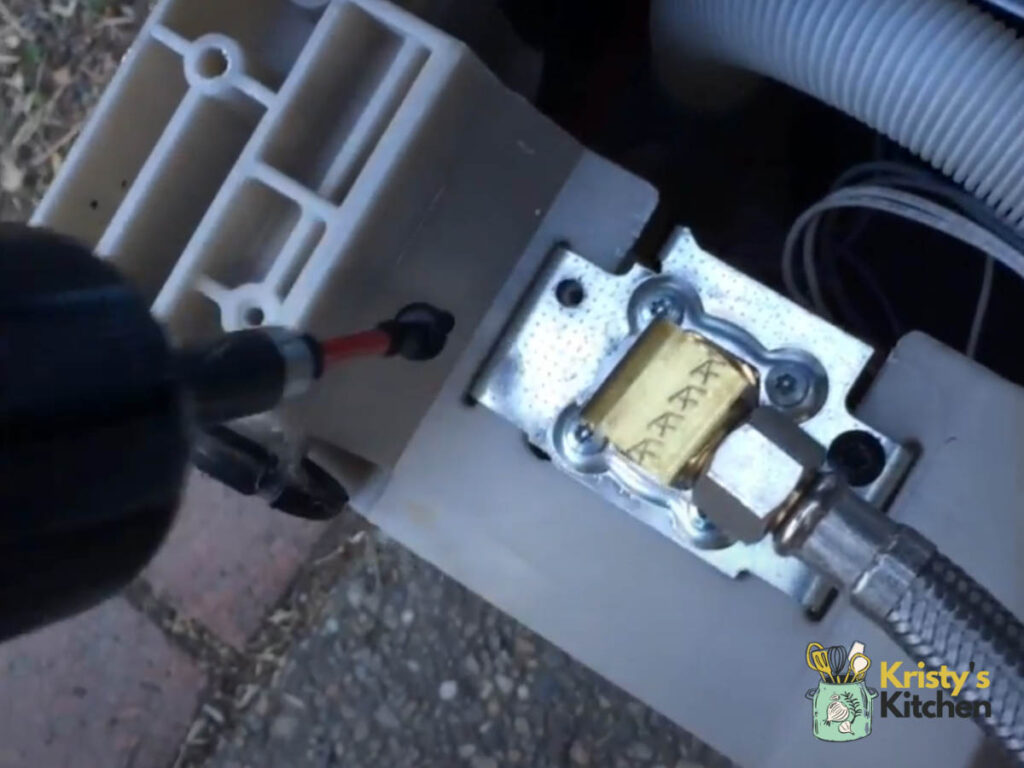
If your bosch dishwasher is not filling with water as it should, you can’t expect squeaky clean dishes. That’s definitely a problem.
The issue might be a malfunctioning water inlet valve, a clogged inlet hose or filter, or problems with the water supply valve.
Step By Step Solution To Dishwasher Not Filling With Water
- Check the water supply valve under your sink and make sure it’s fully open, allowing water to flow freely.
- Inspect the inlet hose and filter for any clogs or blockages. Remove any debris and give the filter a thorough cleaning.
- Verify that your dishwasher’s float switch isn’t stuck or obstructed. This switch is usually located at the bottom of the dishwasher tub and should move freely.
- Test the water inlet valve using a multimeter to check for continuity. If there’s no continuity, it needs to be replaced.
- After replacing the inlet valve, run a test cycle to see if it now fills with water properly.
6. Drying Issues With Dishwasher
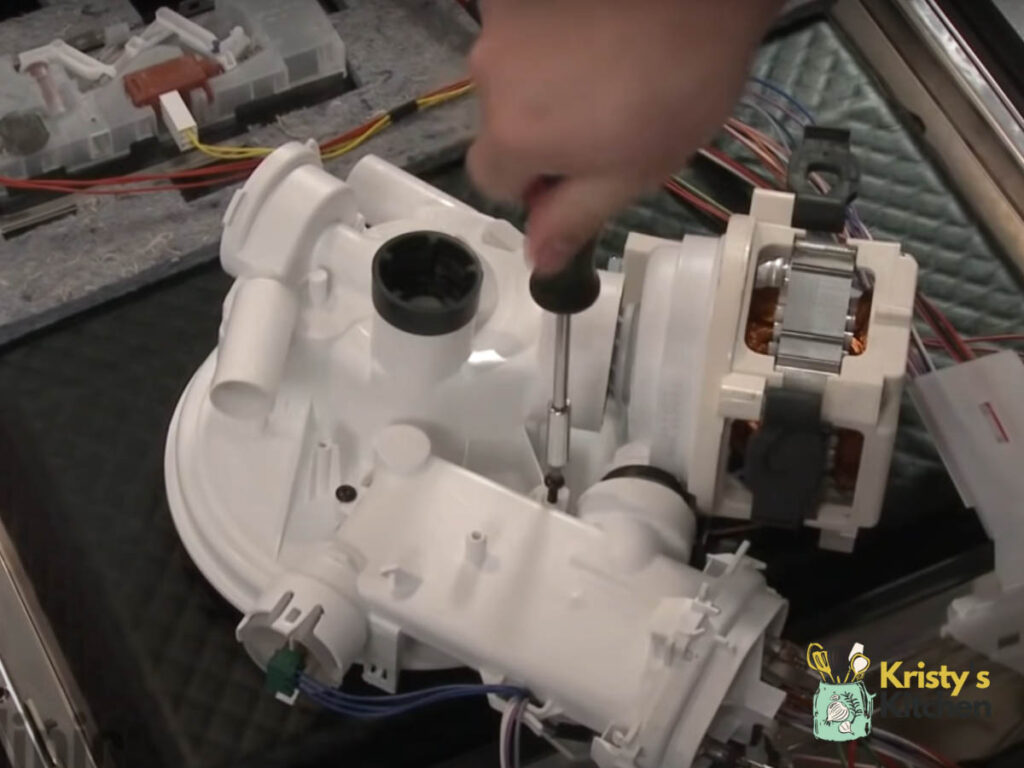
Is your Bosch dishwasher letting you down when it comes to drying your dishes?
Your dishes are supposed to come out sparkling clean and dry.
If they’re still wet, the problem could lie with a faulty heating element, improper loading of dishes, or issues with the dishwasher’s drying cycle.
Step By Step Solution To Drying Issues With Dishwasher
- Verify that your dishwasher’s heating element is functioning correctly. Use a multimeter to test for continuity. If the heating element is faulty, it needs to be replaced.
- Ensure that the dishwasher’s drying cycle option is selected and enabled. Some models offer different drying settings, so refer to the user manual for instructions.
- Load your dishwasher properly, allowing sufficient space between dishes for proper air circulation. Avoid overlapping or nesting dishes that can impede drying.
- Use rinse aid in your dishwasher to enhance the drying process. Adjust the rinse aid dispenser settings as needed.
- Check that your dishwasher’s ventilation system is not blocked or obstructed. Ensure the air vent at the top of the dishwasher door is clean and free from debris.
- Run the dishwasher on a longer cycle to allow more time for thorough drying.
If the problem persists, I recommend consulting a professional Bosch dishwasher technician for further diagnosis and repair.
7. Dishwasher Not Heating
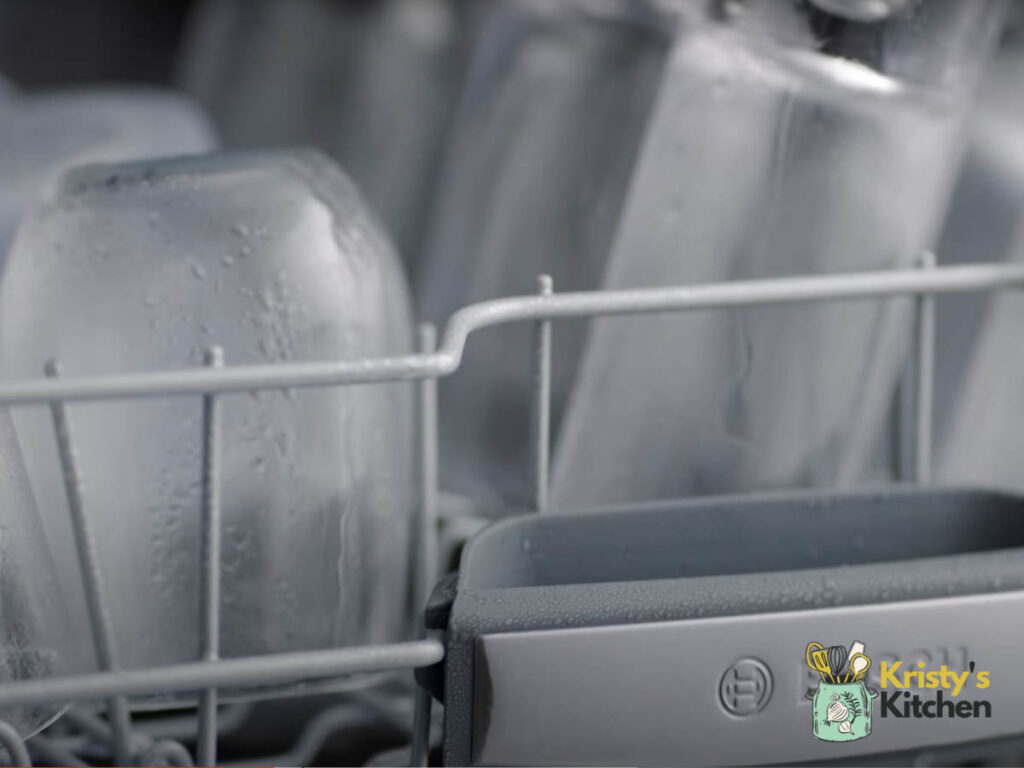
Is your Bosch dishwasher failing to heat the water during a cycle? That’s a concern because hot water is crucial for effective cleaning and sanitization.
The problem may stem from a faulty heating element, a malfunctioning thermostat, or issues with the dishwasher’s electrical connections.
Step By Step Solution To Dishwasher Not Heating
- Check the dishwasher’s heating element using a multimeter to test for continuity. If there’s no continuity, replace the heating element.
- Inspect the dishwasher’s thermostat for any signs of damage or malfunction. Test the thermostat for continuity using a multimeter. If it’s faulty, replace it.
- Examine the dishwasher’s electrical connections to the heating element and thermostat. Ensure they are secure and undamaged.
- Verify that the dishwasher is receiving adequate power supply by checking the circuit breaker or fuse connected to it.
- Run the dishwasher on a high-temperature cycle to see if the heating problem is resolved.
If the dishwasher still doesn’t heat, it’s advisable to contact a Bosch dishwasher service technician for further diagnosis and repair.
Is It Expensive to Fix a Bosch Dishwasher?
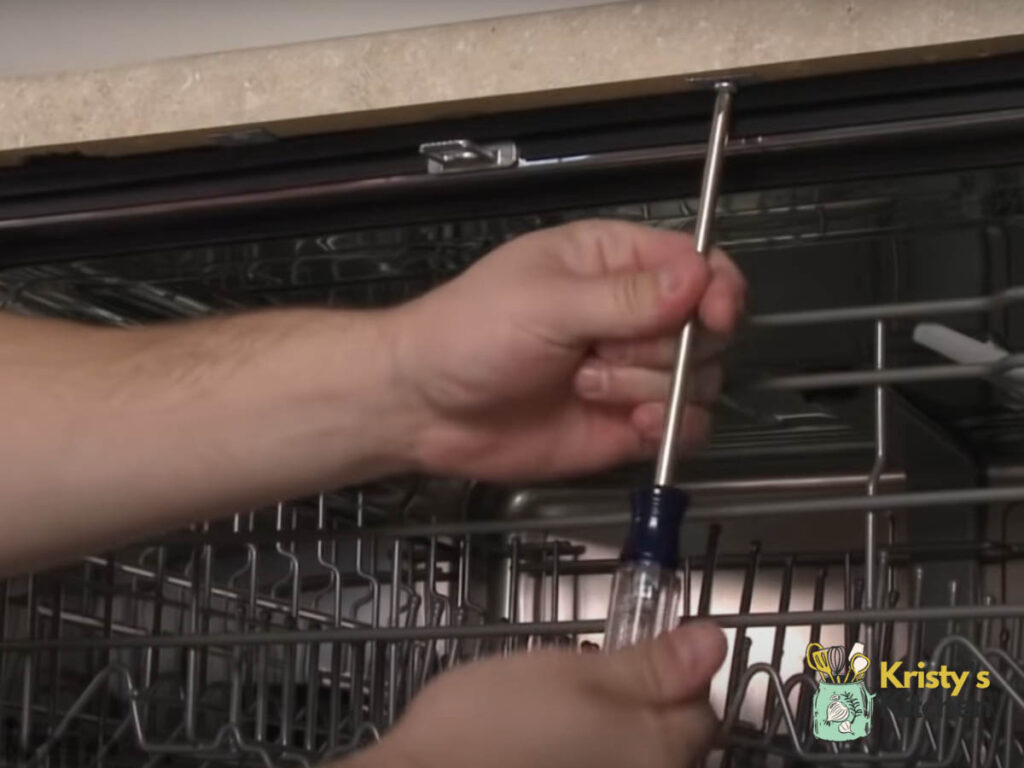
Fixing a Bosch dishwasher can cost different amounts depending on the problem. But overall, it’s not too expensive compared to other appliances.
If you need to replace a broken valve or pump, it can cost around $100 to $200, including parts and labor.
But if it’s a more complicated issue like electrical problems or replacing the control panel, it can be pricier.
Before deciding to fix it, think about how old your dishwasher is. If it’s old and has lots of problems, it might be better to get a new one instead.
To avoid problems and make your dishwasher last longer, take good care of it regularly.
And if something goes wrong, you can always get a professional to check it and give you an estimate of how much it will cost to fix.
If anything from this guide doesn’t work, that is.
Maintenance Tips for Avoiding Problems in Bosch Dishwashers
Doing some simple things regularly can help you avoid problems with your Bosch dishwasher. Here are some tips:
- Clean the Filters Often:
Take out the filters and clean them to stop things from clogging up and to keep the water flowing well.
Look at the manual to see how to clean them properly.
- Scrape Off Extra Food:
Before you put your dishes in, scrape off the big bits of food so they don’t block the drain or spray arms.
This makes sure the dishwasher works well and doesn’t get stuck.
- Use Good Dishwasher Detergent:
Use a detergent made for dishwashers, not regular soap.
Follow the instructions on how much to use so it cleans well and doesn’t leave a residue.
- Put Dishes In The Right Way:
Arrange your dishes so they don’t block the spray arms or stop the water from moving around.
Don’t cram too many things in, or it won’t clean or dry properly.
- Check And Clean the Spray Arms:
Every so often, look at the spray arms and make sure they’re not clogged.
If they are, clean them out so the water can spray properly and clean your dishes.
- Keep The Water At The Right Temperature:
Make sure the water going into your dishwasher is the right temperature (around 120°F) to clean well. Adjust your water heater if you need to.
- Look at the Door Seals And Gaskets:
Check the seals around the dishwasher door to see if they’re worn out or damaged.
If they are, get them replaced so water doesn’t leak out and the dishwasher works well.
- Use The Dishwasher Correctly:
Only use your dishwasher for things it’s meant for.
Don’t put in things that shouldn’t go in, like wooden utensils or delicate glassware that might get ruined.
Follow these tips and deal with problems quickly to make your dishwasher last longer and avoid having to spend a lot on repairs.
Doing regular maintenance and taking good care of it will make sure your dishwasher keeps working well for a long time.
FAQs
What is the life expectancy of a Bosch dishwasher?
A Bosch dishwasher typically lasts around 10 to 15 years if you take care of it properly.
Are Bosch dishwashers difficult to repair?
Bosch dishwashers are usually not hard to repair. However, some complicated problems may need professional help.
Does Bosch dishwasher have a lifetime warranty?
No, Bosch dishwashers don’t come with a lifetime warranty. The warranty period varies based on the model and where you bought it. Most usually get a one year warranty.
How good is the Bosch Customer support?
Bosch provides good customer support. Their representatives are helpful and know a lot about their products. They can assist you with questions, troubleshooting, and finding solutions.
Is Bosch a high-end dishwasher?
Yes, Bosch dishwashers are considered high-quality and top-of-the-line appliances. They have advanced features and are known as a premium brand in the dishwasher market.
Final Thoughts
With the help of this guide, you can bid farewell to those troublesome dishwasher issues for good.
No more scrubbing dishes by hand and fretting about germs.
From unexpected filling to dirty water, drainage problems, and more, you’re now good to take care of them all.
Bosch dishwashers are typically far better in quality than your average options, so I’m sure you won’t need to deal with any more weird issues.
Follow these simple solutions, and your dishwasher will be up and running smoothly once again, making your life easier and more convenient.
